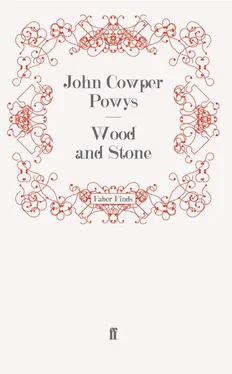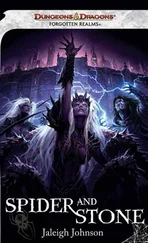A more sombre form by his brother’s side, his broad brimmed hat low down over his forehead, the elder Andersen went on with his carving, in imperturbable morose absorption.
Watching them with languid interest, their arms linked together, stood the figures of two girls. The yellow dust from the sandstone rose intermittently into the air, mingling with the white dust from the road and settling, as it sank earthward, upon the leaves of the yet unbudded knapweed and scabious which grew in the thin dusty grass.
Between Gladys and her cousin — for the girls had wandered as far as this in search of distraction after their lazy tea on the great lawn — a curious contrast was now displayed.
Gladys, with slow provocative interest, was intent on every movement of Luke’s graceful figure. Lacrima’s attention wandered wistfully away, to the cattle and the orchards, and then to the sheep, which now were being penned in a low line of spacious railway trucks.
Luke himself was by no means unaware of the condescending interest of his master’s daughter. He paused in his work once or twice. He turned up his shirt-sleeves still higher. He bent down, to blow away the dust from the moulding he had made. Something very like a flash of amorous admiration passed across his blue eyes as he permitted them slyly to wander from Gladys’ head to her waist, and from her waist to her shoes. She certainly was an alluring figure as she stood there in her thin white dress. The hand which pulled her skirt away from the dust showed as soft and warm as if it were pleading for a caress, and the rounded contours of her bosom looked as if they had ripened with the early peaches, under the walls of her stately garden. She presently unlinked her arm from her companion’s, and sliding it softly round Lacrima’s side drew the girl close against her. As she did this she permitted a slow amorous glance of deliberate tantalization to play upon the young carver. How well Luke Andersen knew that especial device of maidens when they are together — that way they have of making their playful, innocent caresses such a teasing incentive! And Luke knew well how to answer all this. Nothing could have surpassed in subtle diplomacy the manner in which he responded, without responding, to the amorous girl’s overtures. He let her realize that he himself understood precisely the limits of the situation; that she was perfectly at liberty to enter a mock-flirtation with him, without the remotest risk of any “faux pas” on his part spoiling the delicacy of their relations.
What was indeed obvious to her, without the necessity of any such unspoken protestation, was the fact that he found her eminently desirable. Nor did her pride as “the girl up at the house” quarrel with her vanity as the simple object of Luke’s admiration. She wanted him to desire her as a girl; —to desire her to madness. And then she wanted to flout him, with her pretensions as a lady. This particular occasion was by no means the first time she had drifted casually down the vicarage hill and lingered beside the stone-cutters. It was, however, an epoch in their curious relations. For the first time since she had been attracted to him, she deliberately moved close up to the stone he worked at, and entered into conversation. While this occurred, Lacrima, released from her rôle as the accomplice of amorous teasing, wandered away, picking listlessly the first red poppies of the year, which though less flaunting in their bold splendour than those of her childhood’s memories, were at least the same immortal classical flowers.
As she bent down in this assuaging pastime, letting her thoughts wander so far from Nevilton and its tyrants, Lacrima became suddenly conscious that James Andersen had laid down his tools, resumed his coat, and was standing by her side.
“A beautiful evening, Miss”; he said respectfully, holding his hat in his hand and regarding her with grave gentleness.
“Yes, isn’t it?” she answered at once; and then was silent; while a sigh she could not suppress rose from the depths of her heart. For her thoughts reverted to another fair evening, in the days when England was no more than a name; and a sudden overpowering longing for kind voices, and the shadows of olives on warm hill-sides, rushed, like a wave, over her.
“This must be near the Angelus-hour,” she thought; and somehow the dark grave eyes of the man beside her and his swarthy complexion made her think of those familiar forms that used to pass driving their goats before them up the rocky paths of the Apennine range.
“You are unhappy, Miss,” said James in a low voice; and these words, the only ones of genuine personal tenderness, except for poor Maurice’s, that had struck her sense for the last twelve months, brought tears to her eyes. Vennie Seldom had spoken kindly to her; but — God knows — there is a difference between the kindness even of the gentlest saint and this direct spontaneous outflow of one heart to another. She smiled; a little mournful smile.
“Yes; I was thinking of my own country,” she murmured.
“You are an Italian, Miss; I know it”; continued Andersen, instinctively leading her further away from the two golden heads that now were bending so close together over the Leonian stone.
“I often think of Italy,” he went on; “I think I should be at home in Italy. I love everything I hear of it, everything I read of it. It comes from my mother, this feeling. She was a lady, you know Miss, as well born as any and with a passionate love of books. She used to read Dante in that little ‘Temple’ Series, which perhaps you have seen, with the Italian on one side and the English on the other. I never look at that book without thinking of her.”
“You have many books yourself, I expect, — Mr.—Andersen. You see I know your name.” And Lacrima smiled, the first perfectly happy smile she had been betrayed into for many months.
“It is not a very nice name,” said James, a little plaintively. I wish I had a name like yours Miss — Traffio.”
“Why, I think yours is quite as nice,” she answered gravely. “It makes me think of the man who wrote the fairy stories.”
James Andersen frowned, “I don’t like fairy stories,” he said almost gruffly. “They tease and fret me. I like Thomas Hardy’s books. Do you know Thomas Hardy?” Lacrima made a little involuntary gesture of depreciation. As a matter of fact her reading, until very lately, had been as conventual as that of a young nun. Vennie Seldom or the demure Reynolds girl could not have been more innocent of the darker side of literature. Hardy’s books she had seen in the hands of Gladys, and the association repelled her. Pathetically anxious to brush away this little cloud, she began hurriedly talking to her new friend of Italy; of its cities, its sea-coasts, its monasteries, its churches. James Andersen listened with reverential attention, every now and then asking a question which showed how deeply his mother’s love of the classical country had sunk into his nature.
By this time they had wandered along the road as far as a little stone bridge with low parapets which crosses there a muddy Somersetshire stream. From this point the road rises quite steeply to the beginning of the vicarage garden. Leaning against the parapet of the little bridge, and looking back, they saw to their surprise that Gladys and Luke had not only not followed them but had completely disappeared.
The last of the unskilled workmen from the sheds, trailing up the road together laughing and chatting, turned when they passed, and gazed back, as our two companions were doing, at the work-shops they had left, acknowledging Lacrima’s gentle “good-night” with a rather shifty salutation. — This girl was after all only a dependent like themselves. — They had hardly gone many steps before they burst into a loud rough guffaw of rustic impertinence.
Читать дальше












